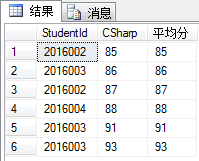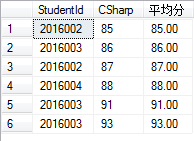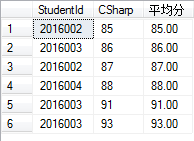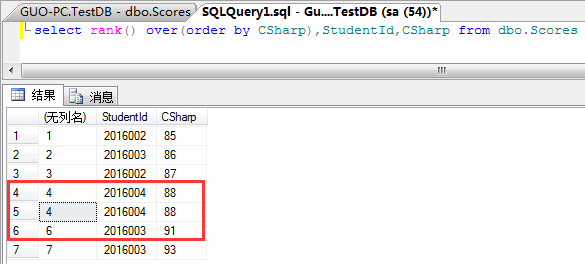SqlServer窗口函数
窗口函数的作用
窗口函数是对一组值进行操作,不需要使用group by子句对数据进行分组,还能够在同一行中同时返回基础行的列和聚合列。窗口函数,基础列和聚合列的查询都非常简单。
语法格式
窗口函数的语法格式如下:
over([partition by value_expression,...,[n]],) - partition by:分组
- order by:排序
首先创建一张测试表:
CREATE TABLE [dbo].[Scores](
[Id] [int] IDENTITY(1,1) NOT NULL,
[StudentId] [int] NULL,
[CSharp] [float] NULL,
[SqlServer] [float] NULL,
[C语言] [float] NULL
)应用实例
1、avg()求平均值:
/*用group by分组
*/
SELECT StudentId, CSharp, AVG(CSharp) AS '平均分' FROM Scores group by StudentId,CSharp/*用over()分组,group by可省略
*partition by studentid,CSharp 表示按studentid,CSharp分组
*/
SELECT StudentId,CSharp,AVG(csharp) over(partition by studentid,CSharp) AS '平均分' from Scores/*用over()分组,group by可省略
*默认情况下所有数据为同一分组
*/
SELECT StudentId, CSharp, AVG(CSharp) over() AS '平均分' FROM Scores /*用over()分组,group by可省略
*partition by StudentId表示按StudentId分组
*/
SELECT StudentId, CSharp, AVG(CSharp) over(partition by StudentId) AS '平均分' FROM Scores 2、cast()转换数据格式
语法格式:cast(原数据 as 新格式)
/*用group by分组
*将avg(CSharp)转换为decimal(5,2)格式
*/
select StudentId,CSharp,cast(AVG(csharp) as decimal(5,2)) as'平均分' from Scores group by StudentId,CSharp/*用over()分组,group by可省略
*partition by studentid,CSharp表示按studentid,CSharp分组
*将avg(CSharp)转换为decimal(5,2)格式
*/
select StudentId,CSharp,cast(AVG(csharp) over(partition by studentid,CSharp) as decimal(5,2)) as'平均分' from Scores/*用over()分组,group by可省略
*默认情况下所有数据为同一分组
*将avg(CSharp)转换为decimal(5,2)格式
*/
select StudentId,CSharp,cast(AVG(csharp) over() as decimal(5,2)) as'平均分' from Scores/*用over()分组,group by可省略
*partition by studentid表示按studentid分组
*将avg(CSharp)转换为decimal(5,2)格式
*/
select StudentId,CSharp,cast(AVG(csharp) over(partition by studentid) as decimal(5,2)) as'平均分' from Scores3、row_number()创建列编号
select row_number() over(partition by StudentId order by CSharp asc) as rowNumber,StudentId,CSharp from Scores需求:按照岗位Job分类,查询出每种岗位的最高工资是多少、哪个人拿到了这份工资
示例数据如下:
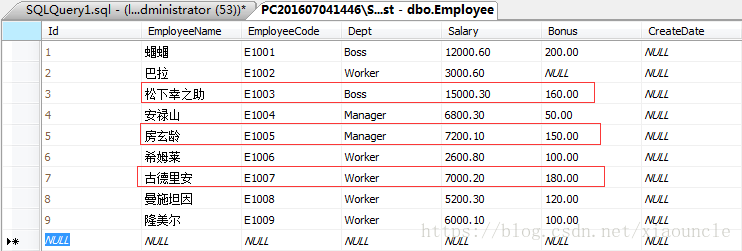
/*row_number()按照Job分类,然后根据Salary降序排列,这样RowNumber=1的行就是工资最高的那一条数据*/
select * from
(select ROW_NUMBER()over(partition by Job order by Salary desc,Id asc)as RowNumber,EmployeeName,Job,Salary from Employee)a
where RowNumber=1;运行截图如下:

4、rank()排序
返回结果集的分区内每行数据的顺序,行的排名是从1开始算。如果两个或多个行的数据相同,则每个关联行将得到相同的排名。
select rank() over(partition by StudentId order by CSharp),StudentId,CSharp from dbo.Scoresselect rank() over(order by CSharp),StudentId,CSharp from dbo.Scores
